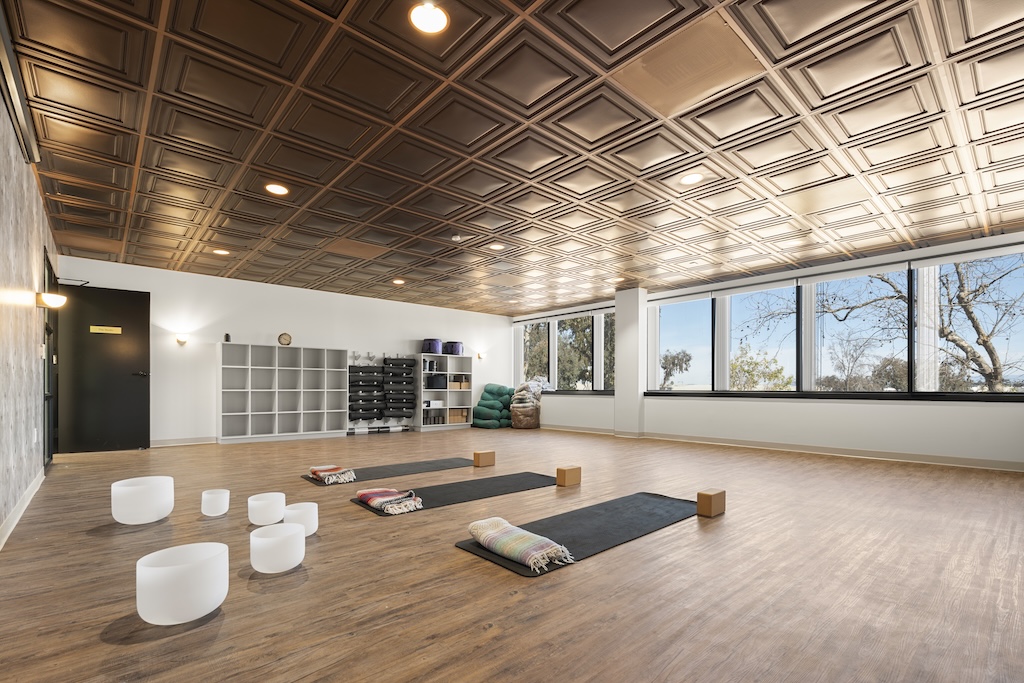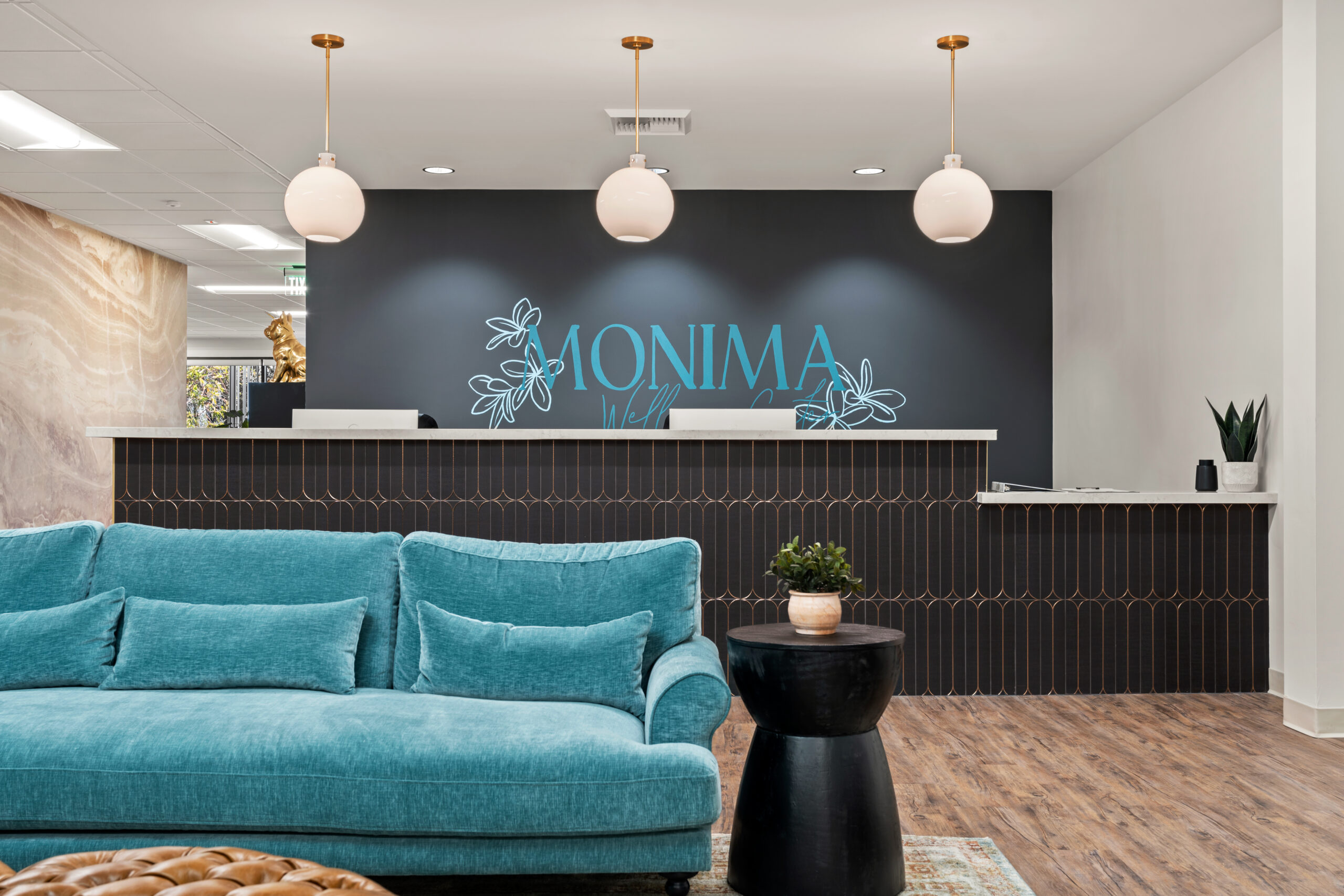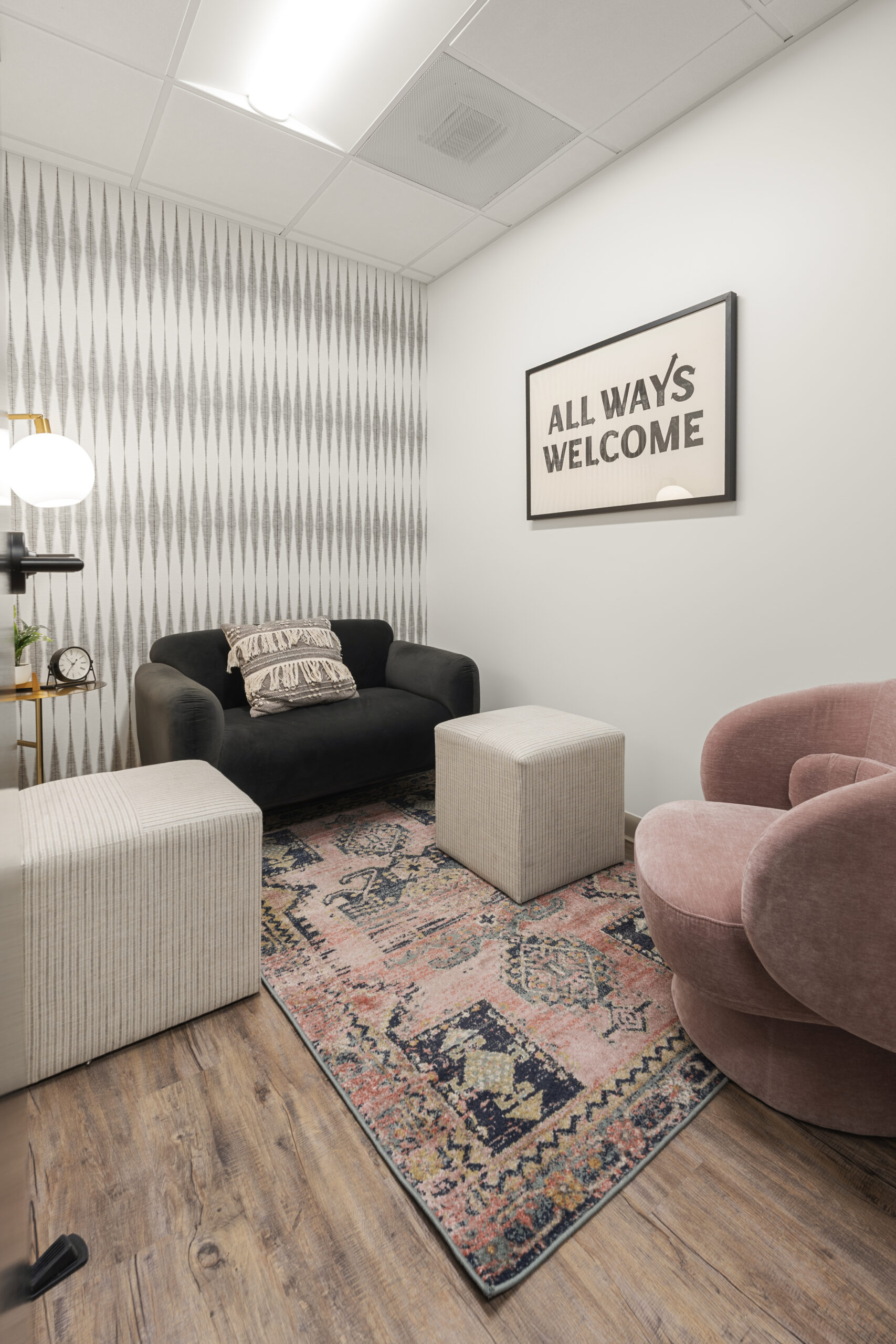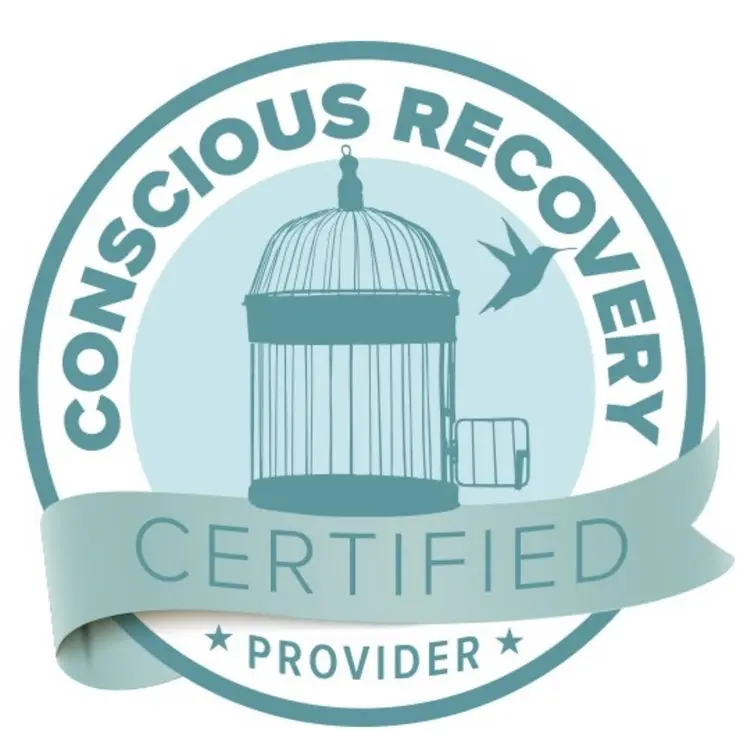Monima Wellness Center offers an Intensive Outpatient Program (IOP) for women in tranquil San Diego seeking part-time, intentional, and comprehensive treatment for challenges related to mental health and trauma recovery.
IOP is designed specifically for women and female-identifying individuals ready for level of support above traditional once-per-week therapy, or as a stepping stone between a full-time recovery program – such as PHP or residential treatment- and returning to their daily routines full-time. Monima partners with Ohana Recovery Residences to provide optional safe housing and a sense of community for all clients.
IOP provides 9-15 hours of therapeutic engagement per week. IOP clients begin program with a combined three hours of group and individual therapy per day, with multiple individual sessions throughout the week, for five days a week. When clients are progressing towards their goals and becoming more confident with their transition to their daily routines, the schedule is adjusted to three hours a day, three days a week. IOP clients are offered a variety of therapeutic modalities with our expert clinical team to meet their unique needs.

Experience the serene and healing environment of Monima Wellness Center, San Diego’s premier outpatient treatment center designed exclusively for women. Our modern facility offers a peaceful sanctuary where women and female-identifying individuals can focus on recovery surrounded by thoughtfully designed spaces for individual therapy, group sessions, and holistic treatments. From our tranquil yoga studio to our comfortable acupuncture rooms, every aspect of our center has been created to support your healing journey. Take a virtual tour to see firsthand the calming atmosphere where women find strength, community, and renewed well-being.
Intensive outpatient treatment at Monima Wellness Center provides a specialized approach to mental health care that bridges the gap between traditional weekly therapy and more intensive treatment options. As a leading provider of behavioral health services in San Diego, our IOP offers structured support while allowing women to maintain connections to their everyday lives.
Unlike inpatient treatment or inpatient care that requires 24/7 residence at a facility, our San Diego IOP enables women to receive comprehensive treatment while returning home each evening. This flexibility makes IOP an ideal treatment option for women who need structured support but don’t require around-the-clock supervision.
Each client at Monima receives an individualized treatment plan developed through comprehensive assessment by our expert clinical team. We recognize that each woman’s journey through mental health challenges is unique, which is why we customize our approach to address specific needs, goals, and circumstances.

We acknowledge that recovery is not one-size-fits-all. IOP at Monima is both intentional and individualized and we offer a variety treatment modalities to address the unique needs and recovery goals of each individual. The IOP schedule is structured so clients receive comprehensive care from a diverse team of clinicians specializing in various modalities.

IOP at Monima is considered a part-time program. IOP often serves as the supportive step or bridge between PHP and returning to work or daily routines. IOP is recognized as the next level of care for clients seeking help beyond weekly or monthly sessions with their provider. IOP provides mental health treatment without the commitment of full-time care.

Monima and Ohana have partnered to provide clients with optional, women-only transitional housing during recovery. Located just a short drive away, clients are surrounded by a supportive and like-minded group of women in a safe, consistent, stable, and inclusive environment that feels like home.
Exceptional experience with Monima Wellness! From the moment I engaged with their team, I was struck by their compassion and expertise in tailoring support (thanks Molly and Nicole!). Their program offers a safe space for growth and healing while fostering a sense of community and empowerment. I highly recommend this program to any woman seeking comprehensive and supportive outpatient care.
The staff here has a wealth of knowledge and experience to guide clients on their journey to recovery. I wouldn’t hesitate to send a loved one here.
Monima gave us confidence in a very stressful time in our lives. The staff here is trustworthy and professional. So grateful for what they did for our family.
Monima wellness Center is incredibly helpful! The staff is among the best in San Diego and are very kind and supportive. The team understands how to help women navigate their mental health. I highly recommend!!!
Monima has wonderful staff who truly care about the well-being and healing of the people the help!
Great Staff who truly care about the treatment of others. They’ve opened up an opportunity and environment for females to really grow and thrive in their recovery.
Monima Wellness Center is a well run, highly ethical program that I would recommend! The facilities are beautiful and well kept. The clinical component is excellent. The leadership team is comprised of experienced and competent professionals that I trust.
Incredibly grateful for each and every person at Monima. The level of care is extraordinary and life changing. The energy and genuine love & care from the entire staff is contagious and brought so much positivity to my healing journey. Thank you to everyone at Monima!
Who-we-who (Thank-You in Eastern Shoshone Language) Monima Wellness Center, for helping me open my eyes to see my true values. My dignity is everything to me. My purpose to life has an endless meaningful mark left on my heart because of this program, and the support of the Ohana sober living.
I’ve been through so much mental health treatment in my life, and nothing compared to the 3.5 months I spent at Monima. The staff were so caring, validating, supportive, and knowledgeable and the connections I made were incomparable. I learned so much about myself and about how to not only cope, but heal. I left Monima with skills to succeed, and with a new outlook on my mental health, my identity, my relationships, and who I want to be going forward. I feel like a new person. Couldn’t recommend more!
I have been meaning to write this for a while now, but I struggled to find the right words because the truth is, there are no words powerful enough to fully express how much Monima has changed my life. I can say, without exaggeration, that I would not be here today if I hadn’t gone through this program. Before finding Monima, I was at my absolute breaking point. I felt hopeless, like the weight of past trauma was finally going to consume me. But from the moment I walked through those doors, everything changed. I was met with warmth, kindness, and a level of care so rare and so deeply genuine that, for the first time in a long time, I felt seen. The people at Monima don’t just do this work—they live it, they believe in it, and they pour their hearts into helping people heal.
I cannot recommend Monima Wellness highly enough. The trauma treatment I received has enabled me to move forward in a healthy and happy way. The staff is kind, professional, and compassionate. Everyone, from the front desk to the therapists and psychiatrists, is truly amazing. I am incredibly grateful for their support.
I know reviews have influenced my decisions before, so they’re important. My experience with Monima Wellness has been nothing short of amazing, life-changing, life-saving, and so much more. I have personally either interacted or received direct services from the owners, and let me tell you: not only do they know their sh*t, but they excel at it. Whether it’s neuropsychology evaluations, diagnostic services, culturally and trauma informed therapy, tons of supports or amazing customer service support, they are the best. Trust me, I’ve met many, but never a team so invested in my support, progress, and success.
This is a great place to heal. Good luck to you on your journey.
Unlike other treatment centers, we provide an integrated, personalized, and diverse range of services that set each patient up for a breakthrough in their wellness journey and the chance at a sustainable and life-changing recovery. We offer a variety of unique treatment options and modalities, including but not limited to:
What's the Difference Between PHP and IOP?
The main difference between Partial Hospitalization Programs (PHP) and Intensive Outpatient Programs (IOP) lies in the treatment intensity and time commitment. Here’s an overview of both programs:
Our Partial Hospitalization Program provides the highest level of outpatient care available in San Diego, with over 30 hours of weekly treatment. Clients attend therapy five to six hours daily, five days per week, creating an immersive healing environment. This structured approach includes daily group therapy, multiple individual sessions throughout the week, and specialized therapeutic interventions tailored to each woman’s needs.
Our Intensive Outpatient Program offers a step down in intensity, providing 9-15 hours of weekly therapeutic engagement. IOP clients typically begin with three hours of therapy per day, five days per week, gradually transitioning to three days per week as they progress. This flexible structure allows women to reintegrate into their daily lives while maintaining significant therapeutic support.
At Monima Wellness Center, our San Diego PHP offers unique advantages specifically designed for women seeking transformative mental health treatment. As a gender-specific outpatient treatment program, we address the distinct challenges women face in their recovery journeys with compassion, expertise, and comprehensive care.
Our dual diagnosis expertise allows us to effectively treat women experiencing co-occurring mental health and substance use disorder conditions. We understand that substance abuse, alcohol addiction, and drug addiction often develop alongside mental health challenges as coping mechanisms, which is why our integrated approach addresses both simultaneously.
Our San Diego PHP offers the perfect balance between intensive support and personal independence:
Our San Diego IOP incorporates diverse therapy sessions designed to build essential coping skills for managing mental health challenges in daily life:
These practical skills support lasting recovery and enhanced well-being beyond program completion.
Recovery extends well beyond the completion of an IOP program. At Monima Wellness Center, we emphasize the importance of ongoing support through comprehensive aftercare planning:
Our commitment to women’s mental health doesn’t end when treatment concludes—we provide resources and connections to ensure sustainable recovery and ongoing well-being.
Contact us today at 858-500-1542 to begin crafting your path to recovery.
Unlike other San Diego IOP programs, Monima Wellness Center offers:
At Monima Wellness Center, we’ve designed our Intensive Outpatient Program to provide women with comprehensive, structured support while allowing the flexibility to maintain connections to daily life. Our San Diego IOP creates a balanced approach to recovery that combines professional therapeutic intervention with the practical application of new skills and insights. When you join our program, you’ll experience a thoughtfully organized treatment journey tailored to your unique needs and recovery goals.
When you join Monima’s San Diego IOP, you’ll begin with a comprehensive schedule designed to provide the support you need while allowing flexibility to maintain aspects of your daily life:
As you progress in your recovery journey and move closer to your treatment goals, our program adapts to support your transition back to daily routines:
Your IOP experience will include access to a diverse range of evidence-based and holistic treatment approaches:
Throughout your time in our IOP, you’ll benefit from:
Every aspect of our San Diego IOP is designed to provide the structure, support, and specialized care women need to heal from mental health challenges and trauma while developing sustainable recovery skills that extend well beyond the program.
Deciding on the most appropriate level of care is an essential first step in the recovery journey. Monima’s San Diego IOP may be the right treatment option if:
Our clinical team conducts thorough assessments to help determine if our IOP aligns with your current needs or whether a different level of care would better support your recovery goals.
Let us help you navigate this important decision—call us at 858-500-1542 for a confidential consultation about how our San Diego IOP can support your healing journey.
As a California-based treatment program, Monima’s San Diego IOP reflects the state’s progressive approach to mental health care through:
Our accredited program is designed to meet the high standards of behavioral health care that California residents expect while providing the specialized support women and female-identifying individuals need for lasting recovery.
The IOP schedule includes between 9-15 hours of evidence-based therapy per week. Upon entry, IOP clients start with three hours of group therapy per day in addition to one hour of individual therapy per week, for five days a week (Monday to Friday).
When a client is nearly ready to return to their daily routines full-time, the IOP schedule is reduced from five to three days. From a daily perspective, the treatment hours and breakdown between group and individual therapy remain the same (three hours per “treatment day” in group and one hour per “treatment week” in individual). The length of the IOP program is determined on a case-by-case basis, but is on average 8-10 weeks.
The key differentiator between PHP and IOP is the amount of time clients spend per week engaging in therapy and with our medical providers. Monima acknowledges that every client has different goals for recovery and are entering treatment at various stages in their wellness journey. As such, PHP and IOP have been intentionally designed to offer two distinct levels of care that address the various medical, physical, emotional, and psychological needs of each individual.
Each client is individually assessed to determine their needs and is recommended to enroll in the program that provides the level of clinical support necessary to properly — and comprehensively — address their needs. PHP is considered the highest level of care available at Monima and is often thought of as a full-time approach to treatment. IOP provides a more moderate level of medical care and is only considered part-time. Both programs offer an array of group and individual therapy options led by masters and doctoral level clinicians across a variety of modalities.
Clients engage in treatment for over 30 hours per week in PHP and 9-15 hours per week in IOP. All lengths of stay are determined on a case-by-case basis and are influenced by a variety of factors including progress towards clinical goals, insurance coverage if using benefits, and ongoing client needs. PHP is often the step between a high-level of care program, like residential treatment, and beginning the transition back into a less structured care setting. IOP is frequently used as a transitional period for clients working towards returning to their daily routines from full-time PHP. It’s also common for people to join IOP as a means of support when weekly outpatient therapy doesn’t feel adequate to address mental health needs.
Yes, Monima works alongside Ohana Resident Services to provide optional safe housing for all women enrolled in their recovery programs. The two facilities are located just a quick drive away so clients become immersed in a recovery-oriented community when living at Ohana.
Monima limits the size of their IOP program to 12 women as we acknowledge the importance of empowering each woman to have a voice during treatment. Keeping groups smaller than 12 gives clients the opportunity to share as much or as little as they are comfortable with the group. Additionally, groups under 12 ensures all members have ample access to one-on-one help with any member of the clinician team.
Yes, every program at Monima has been designed for female-identifying clients. In addition, Ohana allows female-identifying clients to stay at their residences.
A range of trauma-informed therapy options are available in both a group and individualized – setting depending on the preference of the individual. This includes, but is not limited to:
Monima’s San Diego IOP stands apart from other programs through our gender-specific approach, which is designed exclusively for women. Unlike general IOP programs in San Diego, we focus on women’s unique mental health challenges, trauma recovery needs, and healing journeys.
Our program combines evidence-based therapies with holistic approaches including Traditional Chinese Medicine, somatic therapy, and trauma-informed practices—all tailored specifically for women.
With our small group size (maximum 12 participants), individualized treatment planning, and optional women’s recovery housing through our partnership with Ohana Recovery Residences, we create a supportive environment where women can heal among peers facing similar challenges.
You’ll benefit from our inclusive, affirming environment designed for women and female-identifying individuals throughout your time in our IOP. Our partnership with Ohana Recovery Residences offers optional transitional housing during treatment, providing a safe, supportive living environment exclusively for women and female-identifying clients. This unique housing option allows you to be surrounded by peers on similar healing journeys in a recovery-focused community setting just a short drive from our treatment center.
Yes, Monima’s San Diego IOP is covered by many major insurance providers.
We work with numerous PPO insurance plans and can verify your benefits before admission. Our team will conduct a complimentary insurance verification to determine your coverage for our intensive outpatient program and explain any potential out-of-pocket costs.
Financial concerns shouldn’t be a barrier to receiving quality mental health care, which is why we’re committed to helping you understand your insurance benefits and explore all available options for covering treatment. For immediate assistance with insurance verification, please call us at (858) 500-1542 or visit our Verify Insurance page.
Monima’s San Diego IOP provides specialized treatment for women experiencing a wide range of mental health conditions and concerns, including:
Our comprehensive neuropsychological assessment process helps identify each client’s specific needs, allowing our clinical team to create personalized treatment plans using appropriate therapeutic modalities for each condition.
Monima’s San Diego IOP may be right for you or your loved one if you’re seeking a level of support beyond weekly therapy but don’t require 24/7 supervision. Our program is ideal for women who:
The best way to determine if our IOP is appropriate is through a comprehensive assessment with our clinical team. We offer confidential consultations to evaluate your specific needs and recommend the most suitable level of care. Please call us at (858) 500-1542 to schedule an assessment or to speak with our admissions team about whether Monima’s San Diego IOP aligns with your recovery goals.
Find out if Monima is the right treatment center for you or your loved one. Please note: we are an insurance-friendly organization.

